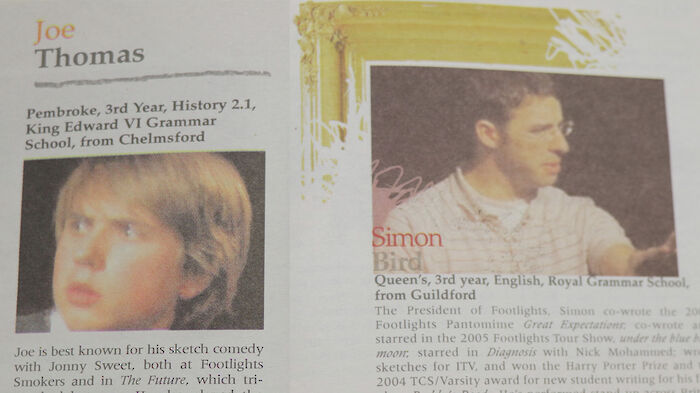Killology preview: ‘a dark, visceral drama’
Director Maya Yousif describes the latest Corpus late show offering as a play that has space for everyone to bring their own interpretations

There’s a controversial new gaming experience gripping the nation. It’s called “Killology”. It’s easy to play; simply torture and kill your opponent in the most gratuitous way possible. Points awarded for creativity and flair. Live out your deepest, darkest fantasies – but don’t imagine you can escape the consequences of your actions. After all, this is a deeply moral game. So, would you play?
This is the premise of Gary Owen’s Olivier Award-winning Killology, a dark, visceral drama that raises far more questions than it answers. First performed at the Royal Court in 2017, the play interweaves the voices of three men – millionaire game designer Paul, teenager Davey and his absentee father Alan – as their lives are ripped apart as a result of this new gaming experience. Director Maya Yousif is keen to emphasise that “the play doesn’t say ‘video games are bad’, it’s more interested in raising questions about how far depictions of violence impact reality, and to what extent parents are responsible for what happens to their kids.”
Ironically, it was Yousif’s family that first recommended she read the play after they had been to watch it without her. She tells me her dad was given the tickets for Father’s Day, an interesting choice given that one of the key themes of the play is an extremely dysfunctional father-son relationship. This will be the second-ever production of Killology, and as such, the team have been able to find their own distinct way of bringing this new writing to the stage. Yousif’s production is consciously stripped back, with minimal but effective use of lighting and sound. The focus is on the space, the actors, and the text. From the way they discuss the play, the cast and crew are clearly enamoured with Gary Owen’s simple yet haunting writing style, which Assistant Director Teuta Day describes as “so natural it feels like real speech”.
It is notable that, when giving direction, Yousif does not tell her actors what to do, but rather empowers them to make decisions
It is obvious that emotional authenticity has been at the heart of the rehearsal process. Yousif and Day explain that they have held individual character workshops throughout the process, using improvisation to allow actors to build their characters from the inside out. These intensive sessions were interspersed with whole cast rehearsals, where the three actors had the opportunity to share the sections of monologue they had been working on and participate in group characterization exercises.
It is notable that, when giving direction, Yousif does not tell her actors what to do, but rather empowers them to make decisions about how their character may respond to a particular event or deliver certain lines. The actors tell me they have become very bonded to their characters, with Harry Redding (who plays absent father Alan) reflecting “it’s been nice to have the time and space to focus on building the character. As an actor, you’ve got to be on the character’s side. In a play with as many moral grey-areas as Killology, that can be difficult. But as an actor you have to understand why your character is doing things you wouldn’t ever do yourself.”
However dark, twisted and viscerally painful the subject matter of the play may become, it never loses sight of the humanity behind the hurt. Actor Stanley Thomas (Paul) reflects “every time I read the play I pick up on new things”, and says he will be interested to see where the audience find their allegiances lie. Yousif tells me “this is a play that has space for everyone to bring their own interpretations.”
In an interview carried out by the Royal Court, Gary Owen said, “In a world where we think very often in headlines, Tweets or memes, a play can spend an hour and a half portraying a situation in all its complexity and contradictions.” As Killology comes to Cambridge for its first ever amateur production, we are all invited to put aside an hour of our time and watch a very human story about flawed, hurting men who are caught in a world where there isn’t a clear difference between right and wrong. This is not a play about video games. This is a play about guilt, violence, revenge, loss, fatherhood, and, ultimately, what it means to be a man in the 21st century.
Killology is on at the Corpus Playroom 15–19 May
 Features / Are you more yourself at Cambridge or away from it? 27 January 2026
Features / Are you more yourself at Cambridge or away from it? 27 January 2026 News / Vigil held for tenth anniversary of PhD student’s death28 January 2026
News / Vigil held for tenth anniversary of PhD student’s death28 January 2026 Interviews / Lord Leggatt on becoming a Supreme Court Justice21 January 2026
Interviews / Lord Leggatt on becoming a Supreme Court Justice21 January 2026 News / Reform candidate retracts claim of being Cambridge alum 26 January 2026
News / Reform candidate retracts claim of being Cambridge alum 26 January 2026 Comment / How Cambridge Made Me Lose My Faith26 January 2026
Comment / How Cambridge Made Me Lose My Faith26 January 2026










